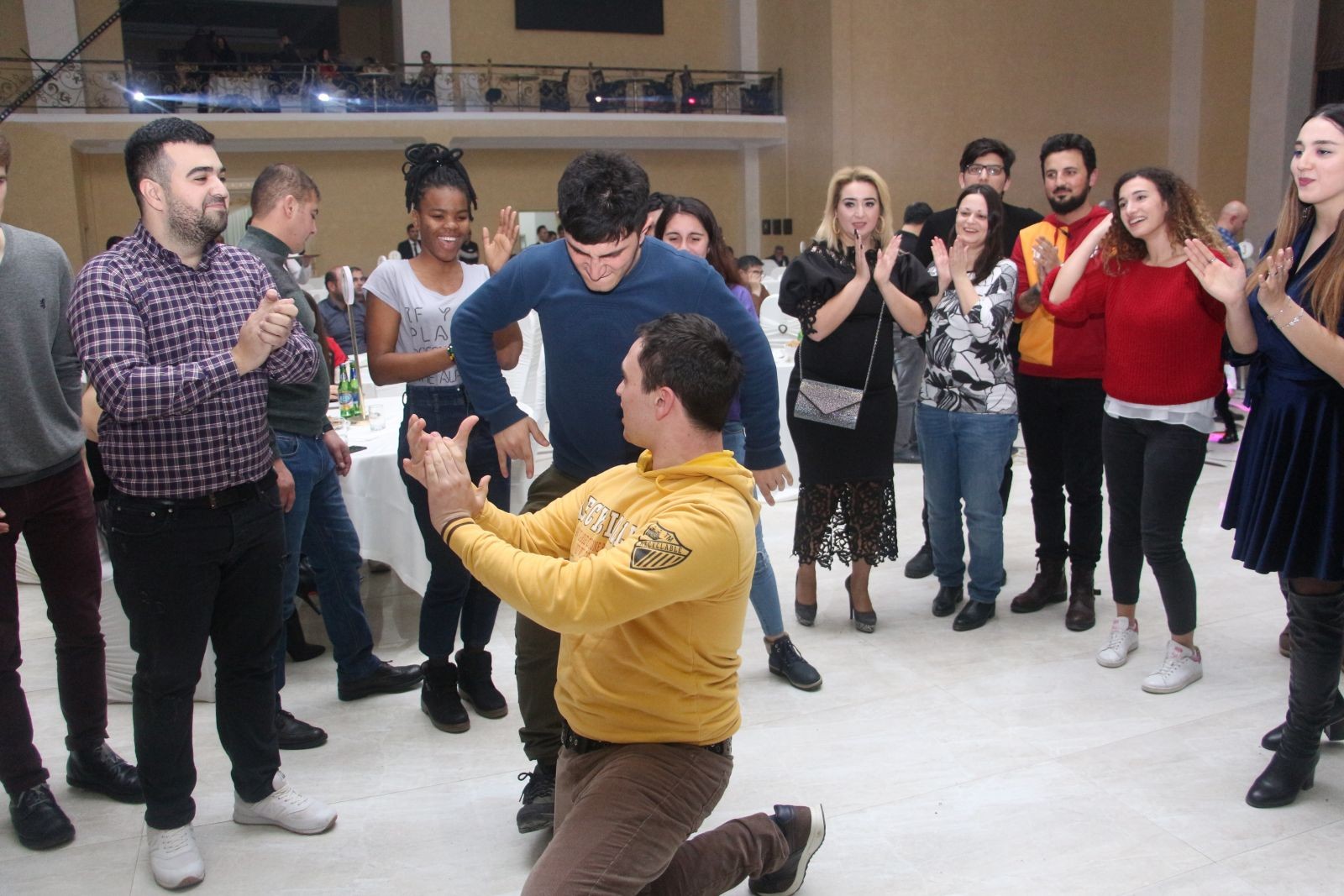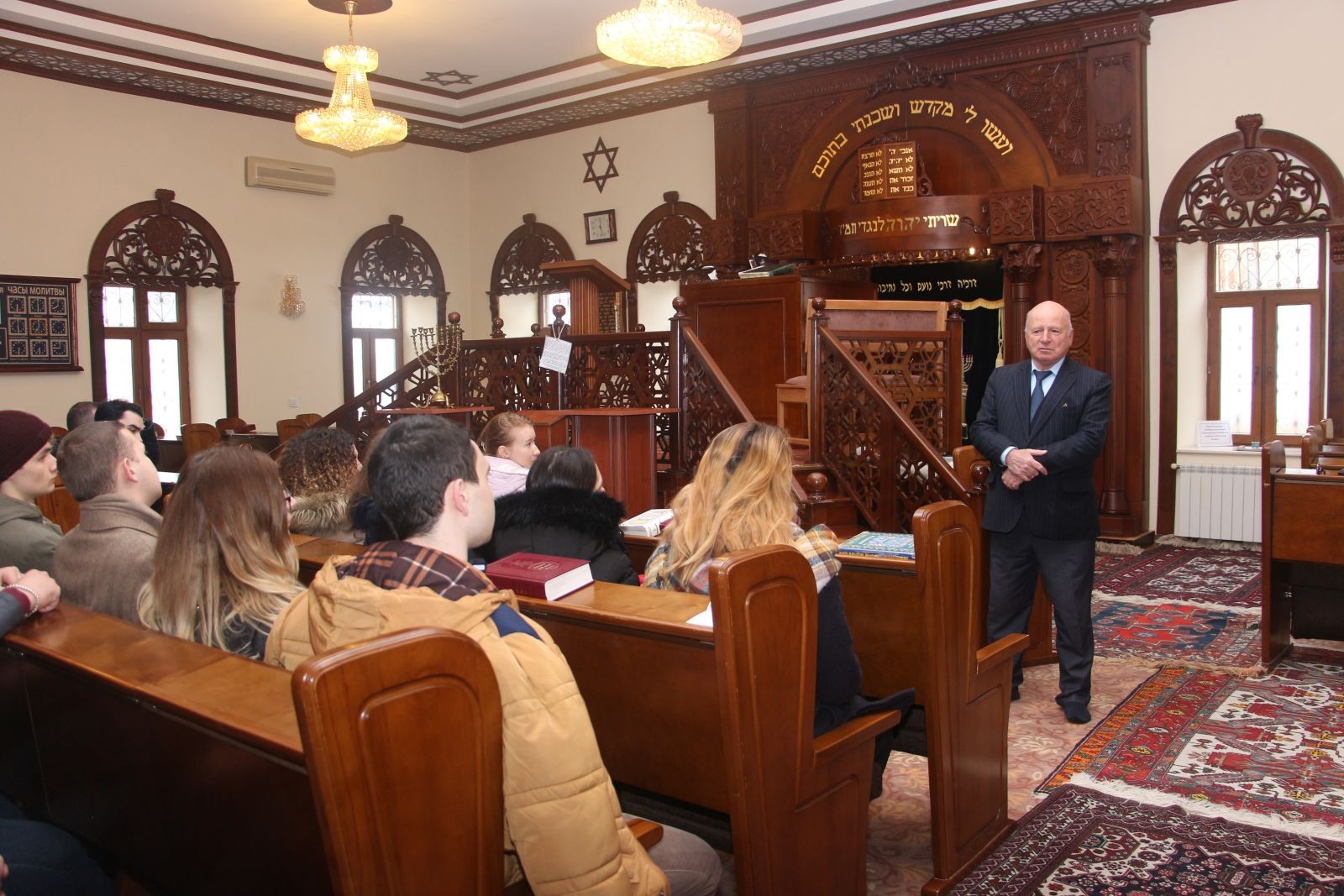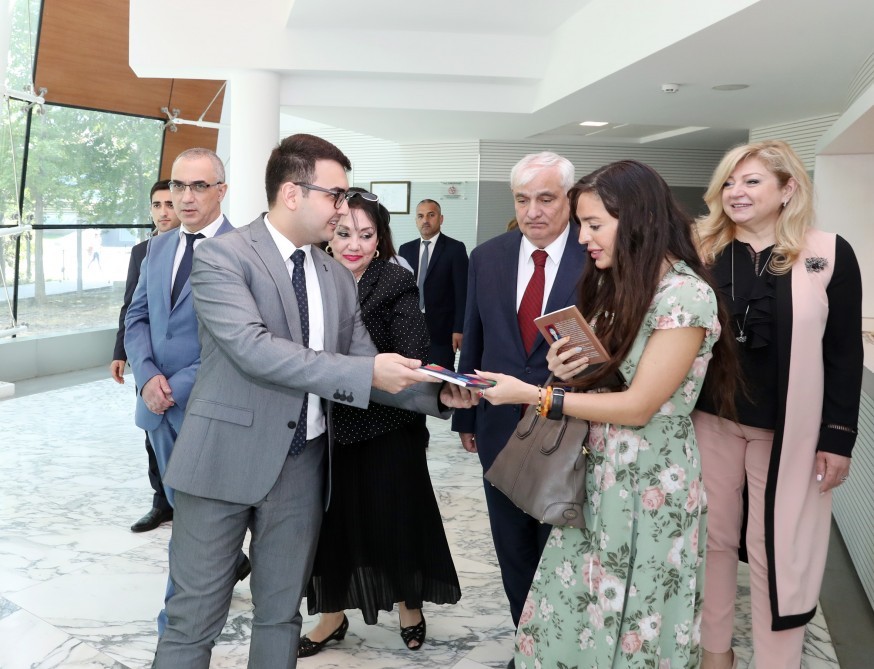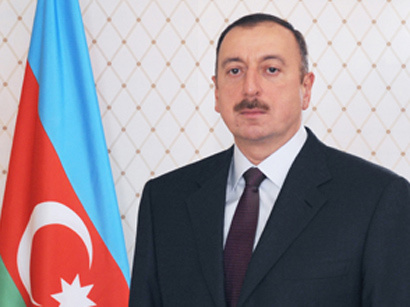There is no Alternative to Multiculturalism

One of the most important factors promoting the stable and confident growth of the Republic of Azerbaijan is Azerbaijani multiculturalism, a course for which was laid by national leader Heydar Aliyev and continued by President of Azerbaijan Ilham Aliyev. In 2014, the Baku International Multiculturalism Centre was established by Presidential Decree to protect tolerance in accordance with the ideology of Azerbaijanism - the cultural, religious, and linguistic diversity in the republic. Recently, the Baku International Multiculturalism Centre celebrated its fifth anniversary. The executive director of the centre Ravan HASANOV kindly agreed to meet with us and spoke in detail about the organization’s activities.
- Good day, Mr. Hasanov. In February 2019, you were appointed Executive Director of the Baku International Multiculturalism Centre. Whether this appointment was of random nature?
- In fact, I contacted the Centre since its foundation. In 2014, President Ilham Aliyev established the Baku International Multiculturalism Centre where I was invited to work as a Senior Advisor immediately after completing my studies in Germany. After a year of work, I was invited to the Service of the State Advisor on Multinational, Multicultural and Religious Affairs under the Presidential Administration of the Republic of Azerbaijan headed by Kamal Abdullayev. In 2017, the Service of the State Advisor on Multinational, Multicultural and Religious Affairs was abolished and I was appointed acting Director of the Baku International Multiculturalism Centre.

During the whole period of the Centre's activity, its team has worked hard, created and implemented various projects proposed by the Centre's Board of Trustees. Successful implementation of the Centre’s projects was highly appreciated by the President of Azerbaijan Ilham Aliyev. The Baku International Multiculturalism Centre adequately represents Azerbaijan and maintains wide relations with other foreign organizations, and it has deservedly become the hallmark of the Republic of Azerbaijan in the world.
- You have received a high-quality education abroad and for some time lived in Germany. In this country, representatives of many ethnic groups work. Tell me, does this experience help you in the implementation of Multiculturalism Centre’s projects?
- I am a lawyer by occupation, I know both Azerbaijani and international jurisprudence, in this sense, the education I received in Baku and in Germany has benefited me. This allowed me to consider and assess the situation in the field of interethnic relations both in Azerbaijan and in the European countries. Azerbaijan has declared multiculturalism as a state policy, while the leaders of many European countries refuse it. I understand the reasons of this and these processes can be compared. Multiculturalism is not only a social or political activity, it is a huge legal base of juridical documents, laws, government programs adopted by the UN and other international organizations that need to be known and professionally integrated into Azerbaijani practice to conduct policy on a legal basis. My legal education helps me a lot in this.
During my stay in Germany, I managed to publish two books and I received invitations from foreign universities, i.e., from the Illinois Institute of Technology. I continue my scientific work in the legal field; I am a thesis scholar of the Azerbaijan Academy of Sciences and specialize in cybercrime cases. My education helps me a lot in my work.
- So what is multiculturalism? Is it a public policy, scientific discipline, system of values?
- Multiculturalism can be viewed in different capacities. As is known, this term was introduced into scientific vocabulary by the theorists of liberalism in the 60s of the last century. This concept was adopted in Canada and some European countries. The today’s world comprises more than 2000 nations of different cultures and religions. And the UN currently unites 193 states. This means that there cannot be mono-ethnic states and the nations should somehow coexist. Multiculturalism implies the peaceful coexistence of different cultures and religions in a single state. When a state not only treats them tolerantly, but also allows other cultures and religions to exist, this is a moderate multiculturalism. Strong multiculturalism implies not only the recognition of the equal-right existence and development of these religions and cultures, but also continuous sustainable governmental support: financial, legal and moral. The Azerbaijani model of multiculturalism can be called strong, because both the President and the state are interested in preserving the multicultural and multi-religious nature of the country. Muslims comprise 96 % of the population, but Islam is not a state religion. All Islamic, Christian and other religious organizations are legal entities. If the government helps them, then it gives everyone equal financial support, if some of them receive any rights, then so do others as well. Azerbaijan allocates state funds to build synagogues, churches, masjids. You would not see this anywhere else. This also expresses equal governmental support for all religious confessions with no place for any discrimination from the state.
In the Muslim community, no one’s rights are infringed on a confessional basis as well. Regardless of the Sunni or Shia disciplines of Islam, all Muslims pray together in the same masjid where there are imams - the Sunni and Shia ministers. This joint prayer is called Wahdat and exists only in Azerbaijan.
Foreign experts express a great surprise to this fact; they believe that the use of the Azerbaijani experience would prevent conflicts between various Islamic movements. We are often asked: “Why do you undertake the construction of Catholic churches? Let the Vatican do it!” It is worth emphasizing that the relations formed between religious institutions and government bodies in Azerbaijan allow control over the internal situation in this sensitive field and prevent any destructive influence from outside. Herewith, the government does not interfere in the internal affairs of the Church, religious organizations; they are equal before the law.
- One of the Centre’s projects is that on Caucasian Albania. Tell us how the project implementation reflects the state policy of multiculturalism?
-As a historian, you probably know that Caucasian Albania is one of the most ancient Caucasian states. It adhered to the Christian faith. The Albanian Apostolic Church has started its religious path since the 4th century. In the history of the Church, the Albanian Apostolic Church is known as autocephalous one. After the fall of the Albanian principality in the 8th century, part of the Albanians managed to preserve their culture, religion, and language. But in March 1836, by the decree of Emperor Nicholas I, this Church was subordinated to the Armenian-Gregorian Church. As a result, the Albanian Apostolic Church lost its freedom and became an instrument of Armenian propaganda in its claims for Azerbaijani lands. Currently, this project reflects our state interests and is the heritage of the Azerbaijani people. The Udis, an ethnic minority living in the Gabala region of Azerbaijan, have remained the Albanian church followers, but they have nothing to do with the Gregorian Church. Our goal is to inform the world community about the history of the Albanian Apostolic Church, its significance in the Azerbaijani culture and to restore its autocephality. The leading domestic and foreign scientists are involved in this process: PhD in History, Corresponding Member of the Azerbaijan National Academy of Sciences Farida Mammadova, Ph.D. in Philology, theologian Bion Wegge (Norway), Artem Kuranov (Russia), and other scientists. Various scientific events, round tables have been held, sourcebooks published. We will continue working in this direction.

- Coming back to our common history, how do you think, how applicable is the term “multiculturalism policy” to the Soviet state? As is known, the USSR consisted of 15 republics in which hundreds of peoples lived.
- I do not think that this term may be adequately applied to the national or religious policy of the Soviet Union. Of course, it cannot be denied that in the Soviet Union, all peoples lived together. But this does not correspond in any way to the today’s meaning of the concept of multiculturalism. The Soviet state was not interested in the development of national identities of the Azerbaijani, Kazakh, Uzbek or other peoples. Certainly, there was a negative attitude towards religion in the Soviet Union, and a single faith - communism. In the struggle for power, the Bolsheviks talked about rights and freedoms, they daren’t declare that all nations would lose their identity, but systematically worked on creating the uniform Soviet people. This does not correspond in any way to the meaning of the concept of multiculturalism. Of course, Soviet society was multicultural, but state policy was not!
- The Multiculturalism Centre was established in May 2014. Since then, interest in the Azerbaijani model of multiculturalism has considerably increased. Your Centre has made a great contribution to the popularization of the Azerbaijani model of multiculturalism in the world; in many countries, the Centre has opened branches. Tell us about their activities!
- For the last 5 years, the geography of the Multiculturalism Centre’s activity has expanded significantly. To date, the Centre has opened branches in universities and scientific centres of 9 countries, which are led by well-known public figures of these countries - Bridget Weisberger (Germany), Teresa Damasio (Portugal), Arye Gut (Israel), Jeanne Scott (USA), Grigoriu Aurelia (Moldova), Aleksandr Nesterov (Russia), Ludmila Bejenaru (Romania), Sandro Teti (Italy), Elisa Nikolova (Bulgaria). The branches are engaged not only in promoting the Azerbaijani culture, but also in spreading the ideas of multiculturalism in the political sphere. As an international organization, our Centre demonstrates to the world that for now, there is no alternative to multiculturalism, because all nations have the right to preserve their original culture, this is fixed in the norms of international law.
We assist in teaching the Azerbaijani model of multiculturalism in the universities of Azerbaijan and foreign countries, have prepared training programs, materials, textbooks in English and Azerbaijani languages, and a textbook in Russian is being prepared for publication. The largest universities of Japan, India, Poland, Lithuania, the Czech Republic, Italy, Romania, Germany, and Switzerland included the discipline of Multiculturalism in their curriculums. Herewith, it is worth noting that our state does not provide any funding to branches, does not pay salaries to their employees, this is entirely an initiative of the foreign universities’ leadership. We only assist in the implementation of some major events, i.e., organizing international conferences.
- Kazakhstan is the close neighbour, partner, brother of Azerbaijan. How does Kazakhstan participate in the Centre’s scientific or research projects?
- The Baku International Multiculturalism Centre maintains good partner relations with colleagues from Kazakhstan; we have repeatedly held joint events, two joint conferences, we are very attentively studying the multicultural model of Kazakhstan. In 2015, jointly with Kazakhstani turkologists, we held an international colloquium dedicated to the 200th anniversary of publication of the Oguz dastan “The Book of Dede Korkut” by the German orientalist Friedrich von Diez. In Kazakhstan, we still do not teach Multiculturalism, but this is an upcoming task. Negotiations are underway between the state bodies of our countries. We are much interested in your multiculturalism model and pay great attention to cooperation with Kazakhstan.
- We see the crisis of the theory of multiculturalism in Europe. This is confirmed by the victory of right-wing parties in the last elections to the European Parliament. What do you think of that? Whether the multiculturalism model is wrong and deadened?
- The whole world is watching this process. European society tried to apply variants of assimilation and isolation. But nothing came of it. Currently, the European model of multiculturalism has exhausted itself. What next variant will be offered to the public? Many people think about.
- President Ilham Aliyev declared 2016 the Year of Multiculturalism. What spiritual and moral values underlie multiculturalism?
- Our President in his speeches calls multiculturalism a lifestyle. The Azerbaijani people have always been tolerant, hospitable, multicultural. The political founder of this concept was Heydar Aliyev. On a global scale, this is continued by our President Ilham Aliyev. Azerbaijan has undertaken an inter-civilization, intercultural dialogue. When President Ilham Aliyev declared 2016 the Year of Multiculturalism, all public organizations in Azerbaijan picked up this idea. In 2016, a lot of events, publications, forums took place. If earlier Azerbaijan was known abroad as a rich oil country, now the situation has significantly changed. They speak of us as a multinational country where all people are equal, all religions are represented. This is also very important! Our multiculturalism model is a brand of Azerbaijan. When there is no stability in society, then there will be no economic development in the country. If there is no internal harmony, then it is impossible to develop other areas.

- In conclusion, please share your prospects for the nearest future!
- In the nearest future, we will conduct the 9th summer school. Summer and winter schools are a logical continuation of theoretical multiculturalism courses. We invite students who are already familiar with the Azerbaijani culture. At this summer school, for the first time, a youth forum will be held where more than 100 foreign students will take part. Together with Azerbaijani students they will conduct an intercultural dialogue. I hope we will manage to create such a public youth movement. In the autumn, we plan to hold an international conference on Caucasian Albania. In addition, the Centre is continuously working with community organizations, which also need our support.
- Thank you very much! I wish success to the International Centre!
Author: Arman SULEYMENOV














